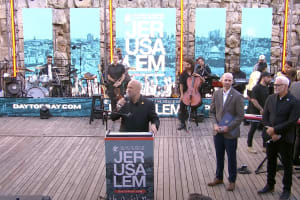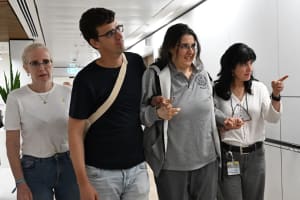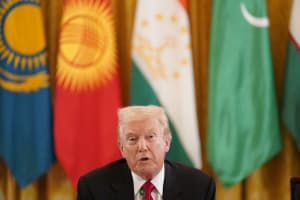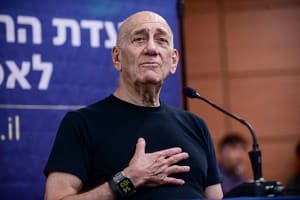Gaza stabilization force ISF can't be an 'ineffective mechanism' that 'destabilizes situation’, warns Israel's UN envoy Danon
Negotiations over ISF resolution expected to last several days, Israel surprised it was not updated

Israel's Ambassador to the UN, Danny Danon, addressed the U.S. sponsored resolution to the UN Security Council regarding the establishment of the international stabilization force (ISF) for Gaza, telling The Jerusalem Post that such a body cannot become “another UNIFIL.”
Danon’s comments came after the U.S. convened a meeting of the Security Council on Wednesday in which it presented a draft resolution regarding the ISF's mandate.
Alongside nations from the Security Council, the U.S. also invited representatives from the United Arab Emirates, Saudi Arabia, Qatar, and Turkey to join the meeting about the establishment and deployment of the ISF in Gaza.
HISTORIC meeting today with the UN Security Council’s elected members to present the resolution on Gaza.
— Ambassador Mike Waltz (@USAmbUN) November 6, 2025
Egypt, Qatar, Saudi Arabia, UAE, and Türkiye joined us — STRONG support for the Gaza resolution and President Trump's BOLD 20pt Peace Plan.
This is all happening in the… pic.twitter.com/a4rXv1qLon
Following the meeting, Indonesian Foreign Minister Sugiono, whose country also received a draft copy, said, “the draft of the resolution is still in the early stages of discussion, very early, they only distributed the 'draft zero’.”
"Because it was only conveyed in yesterday's meeting, each country has its own opinions and thoughts that may be input for consideration," Sugiono told reporters in Jakarta on Wednesday.
Indonesia has been discussed as one of the countries contributing troops to the ISF. Sugiono confirmed this, saying, "In general, we convey that Indonesia is ready to contribute to this peacekeeping process.”
The U.S. had not updated the Israeli government before convening the meeting, according to an anonymous official from the Israeli National Security Council, who told i24 News that the move caught the government by surprise.
“We have not received the document. Journalists have more information than we do; it makes no sense,” the Israeli official told the news agency.
A cabinet source told The Jerusalem Post that the Israeli government must be involved in the discussions.
“Since these are the most dramatic issues, we must be involved. The fact that the prime minister thinks the resolution could be molded in Israel’s favor does not mean we can relax and assume it will be in our favor. We are in a make-or-break event. It is 'take it or leave it,” the source said.
The U.S. mission to the UN released a statement saying that President Donald Trump was determined to “achieve concrete results.”
"Under President Trump's resolute leadership, the United States will achieve concrete results at the UN, not empty words. The parties have seized this historic opportunity to put a definitive end to decades of bloodshed and to realize the president's vision of lasting peace in the Middle East,” the statement read.
UN Ambassador Danon said that Israel will be closely watching the negotiations over the resolution in the coming days.
“We have to learn from the mistakes of the past,” Danon told the Post. “You want something constructive and effective, not an international presence that looks good on paper but actually destabilizes the situation.”
He said Israel does not want another UNIFIL (UN Interim Forces in Lebanon) on its southern border.
“The US draft resolution continues the spirit of the Trump plan, which Israel welcomed,” Danon said. “We would like to see the involvement of other countries in the region, especially those capable of dealing with the disarmament of Hamas. But we must ensure we don’t create an ineffective mechanism, like UNIFIL.”
Danon said that Israel’s standard is effectiveness, “We can’t afford a symbolic force that doesn’t act.”
“Success means results on the ground, the disarmament of Hamas,” Danon stated.
Israel is not the only nation to express reservations over the ISF resolution. Recent reports in Arab and international media have indicated that several of the countries expected to contribute to the ISF or to the reconstruction of Gaza have expressed significant reservations based on competing interests.
Lebanese media reported on Tuesday that there are gaps between the demands of the UAE and Saudi Arabia on one side, and those of Qatar and Turkey on the other. The latter are said to be opposed to the ISF being tasked with disarming Hamas, while the UAE and the Saudis are demanding that as a condition of investing in reconstruction and governance efforts.
Several Arab media outlets also said that Egypt is concerned that its economic and security interests are not being adequately represented, as the U.S. focuses more attention on the interests of the wealthier nations of Qatar, the UAE, Saudi Arabia, and Turkey.

The All Israel News Staff is a team of journalists in Israel.
You might also like to read this:














